AFTERILOVAISK. “Aknod”
“ I never thought that I would fight. “
Alexei Rubets, call sign “Aknod”
I never thought that I would fight. When there was Maidan, I assumed that it would be dispersed, but I did not think it would be as bloody. We started discussing it with my father; he was alive then. And when Crimea was already taken I called him and said, “The war begins, I have to go to war.” He said, “Wait, son, we’ll go together.” Well, five days later he passed away.
In 2014, when I decided to go to the war, it was just 40 days after my father’s death; it was on May 1. My commander of a self-defense unit called me and said, “You have to come.” I told my mother, “Mom, I will go to war.” And she said one important thing, “No independence to any country was given without blood. We took this country back 23 years ago, now our task is to defend it. And one must pay for it in blood. Go, son.” This was my mother’s decision. But my wife… She knows that if her husband has already made up his mind, then… I’m not a despot, in our family democracy prevails. Lena, my wife, knows perfectly well that my decisions usually lead to something right. And so she said, “Well, then go.”
“No independence to any country was given without blood. We took this country back 23 years ago, now our task is to defend it. And one must pay for it in blood. Go, son.”
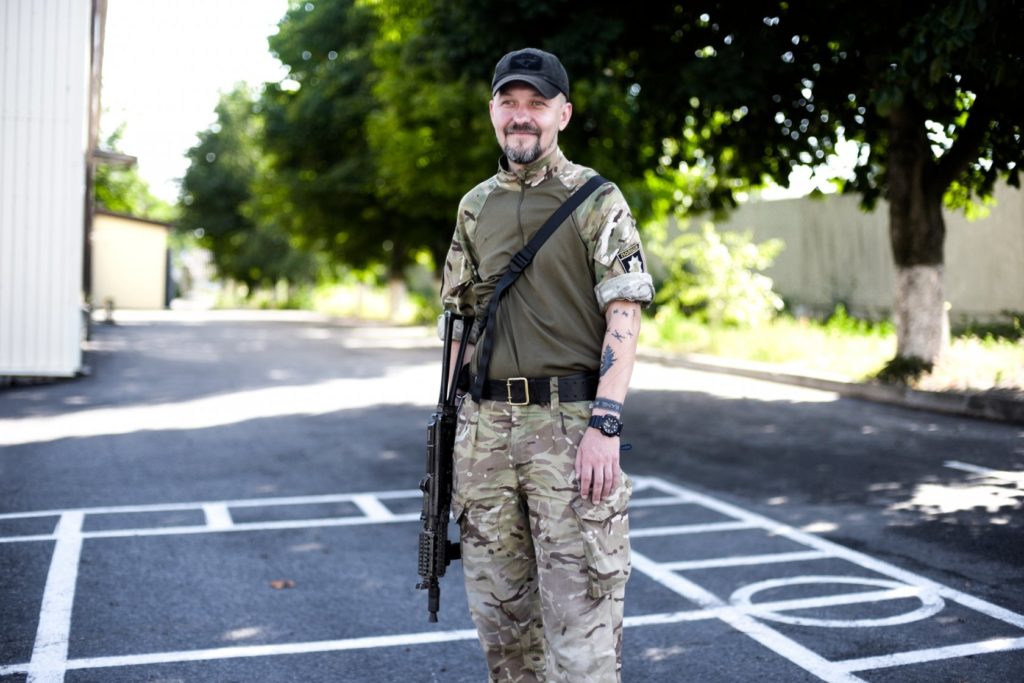
Then began the organization of the self-defense of Dnipro city. I chose the 9th sotnia of self-defense. Two of my commanders serve there now too. One of them works in the police of Dnipro, and the other in the National Guard in the ATO zone.
We underwent 5-day training in the Academy of the MIA, two weeks at the training ground and after that were immediately sent to Ilovaisk. In fact, we learned on the spot.
There were about twenty of us when we arrived, but on August 21 those who cannot fight could leave. Seven people left the platoon and there remained thirteen of us. On August 29 only five (out of thirteen) came out of Ilovaisk, the rest fell.
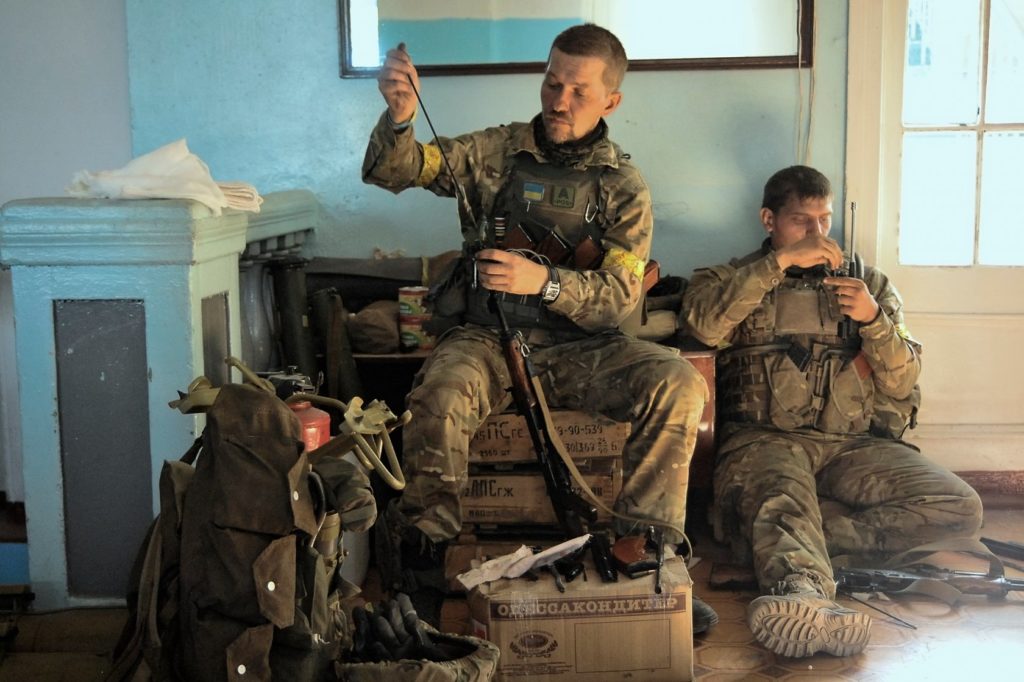
Military equipment, wounded soldiers were carried along the road that leads from Donetsk to where we stood (self-defense checkpoint), not far from Pidhorodne. We saw it all, letting these cars pass. Once one of the soldiers arrived, his arm was shot and he was … let’s say, empty-headed, “Buddies, you do not see what is going on there!” And stood still; we had sandbags there, and with a healthy hand he smashed several of them; he could not stop. And we could not stop him either. At that very moment, I realized I can withstand more than this.
Then the first corpses began… The army truck arrived, dirty soldiery dropped out of it; this bad smell is impossible to forget up till now. They brought documents to relatives, somebody from Pidhorodne fell. We looked into the truck bed. In bags were… well, in fact, it cannot be called human remains. And so, the determination (to go to the war) continued to mount. Then Grad (MRLS) began shelling.
For three months I have been trying to obtain documents. I had no documents, not even a military ticket; I did not serve in the army. I wrote an application to the “Dnipro-1” three times and finally, I was taken. In the military registration and enlistment office told that there was no recruitment, unlike in Dnipro-1. And so, I got to the war for a fortnight. It’s scary at the war. You know it perfectly well. It is very scary. But the main rule in the war is that if you’re scared then do something: bandage people, carry cartridges, fire. War is terrifying, but for some reason, you really want to go back there.
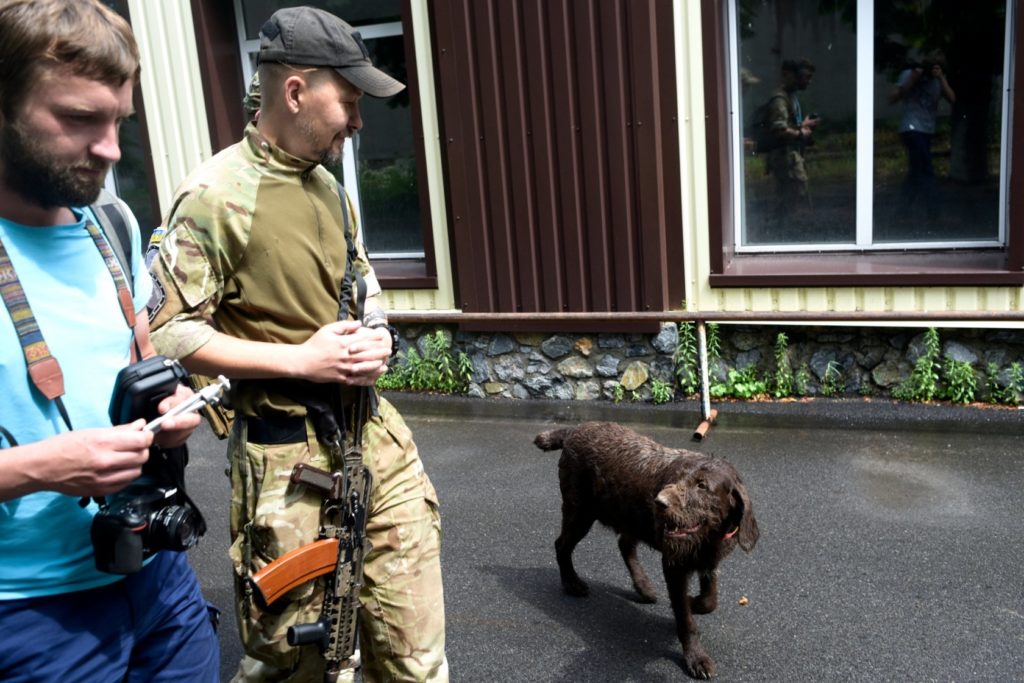
In Ilovaisk no medical care was rendered to people, a few knew how to do it. In the spring of 2015, I took courses conducted by Americans. Now I teach people here, in Dnipro. I go to schools, tell children about medicine, patriotism. I believe deeply… I’m not sure that my generation will witness any improvement. Or, if we do, we will be very old. But my children, our children, they will live in a different country. I traveled around Europe, thanks to the rehab courses. I was in Croatia, where up to now stand the ruined cities, where still are mined forests and fields. They are free people, they live differently. I believe that many of those who are currently fighting and disappointed must be sent at least for a week abroad; to such countries as Croatia, Serbia. Then they will understand that everything is changing.
Would I go back to war if the action were resumed? Yes. And I will go. Even after the dismissal, since the UAF (Ukrainian Armed Forces) enlist experienced soldiers. Right now, I need to be with my family; a son has been born to my family.
War is terrifying, but for some reason, you really want to go back there.
The worst thing about all this was that I promised my daughter to be with her on September 1, when school begins. During the time of my captivity, all these 4 days, I was blaming myself for having failed in my promise. She could not forgive me for a very long time. Probably, she is sulking because of me until now. We made peace though. When I left she was a child of nine, and when I came back, almost an adult girl visited me at Mechnikov (Army Hospital). I can only imagine how they lived while I was gone; Lena went to the hospital to identify by tattoos whether it was her husband or not.
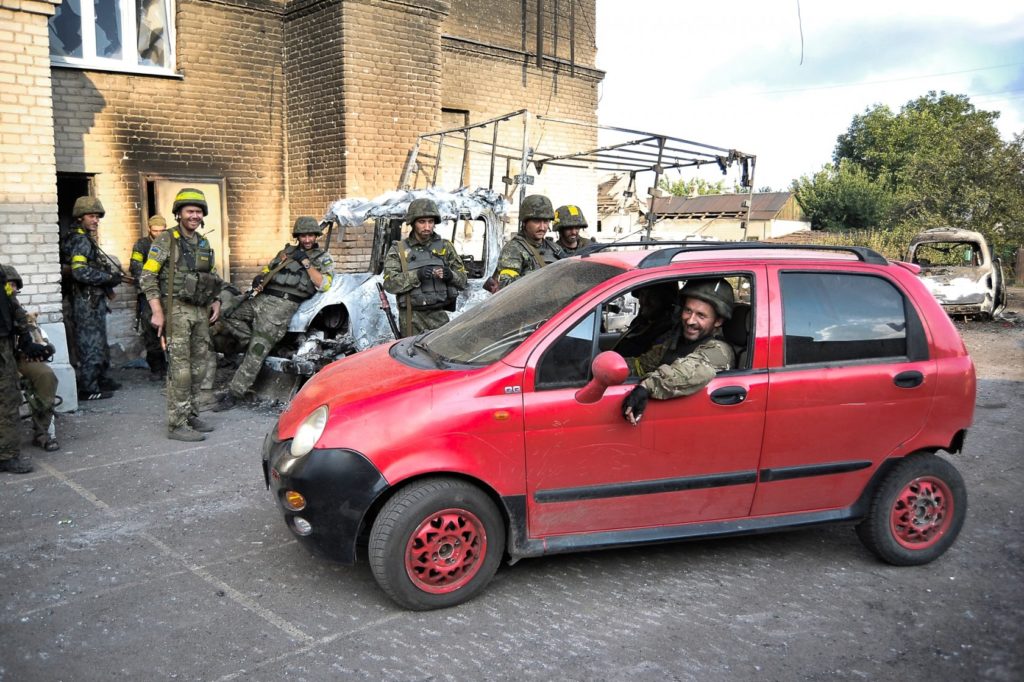
We were seriously injured. The Russians did not need us – separatists would simply finish us off. The Russians did not deliver us into their hands so that the Red Cross could take care of us. We should have been picked up on August 31 along with a hundred of ours. And we were taken from Rostov, from the Rostov region. Due to a shelling, they took one of their wounded and one dead by the same car. We were one or two hours late for the evacuation and stayed there two more days. Then the car arrived, and broke through; we drove in a column.
There were 11 of us. We sat in the car and asked the driver, “How many of fallen are there?” He said, “At the moment, there are 2 cars with 300 bodies and one with 200 bodies” (2 cars with 300 bodies in the truck bed, and one with 200 bodies in the truck bed). The bulk of the body lay in KAMAZ. And now when they say that 360 fell, I do not believe. With my legs being shot, I was going through corpses, I saw the bus of «Myrotvorets», riddled with bullets, pieces of bodies of our boys. Also, there was Bogdan, the burnt body of “Brus”. How can that be possible? It was just a part of the column, and I did not reach the end of it, though I went four kilometers, six hours long.
I think the Russians did not go further just because they saw the force, because they were repelled
I think the Russians did not go any further just because they saw our force because they were rebuffed. The column advanced (from Ilovaisk) towards Mnohopillya and stopped. I had an officer’s walkie-talkie (because I was in charge of the training platoon and two minivans) and an internal, ours. I heard all the talk: the time and with whom we push forward, that Russians are not be trusted, and so on. As soon as we advanced, they immediately began to fire at us. From the hill that was on the left. One of the mines lay before our bus. No one got wounded, but the bus cut out. If we had gone out in full force, there would have been fewer losses. As our IFV stopped, some of us should change to it, the bus stopped, two more men were boxed inside. That is how I directed them. And in the last IFV, my soldiers got in too. Sep’s main target was armored vehicles. That’s why we had so much loss of a training platoon – minus 8 people in one day. Only one remained without injuries. The rest were wounded, and quite hard.
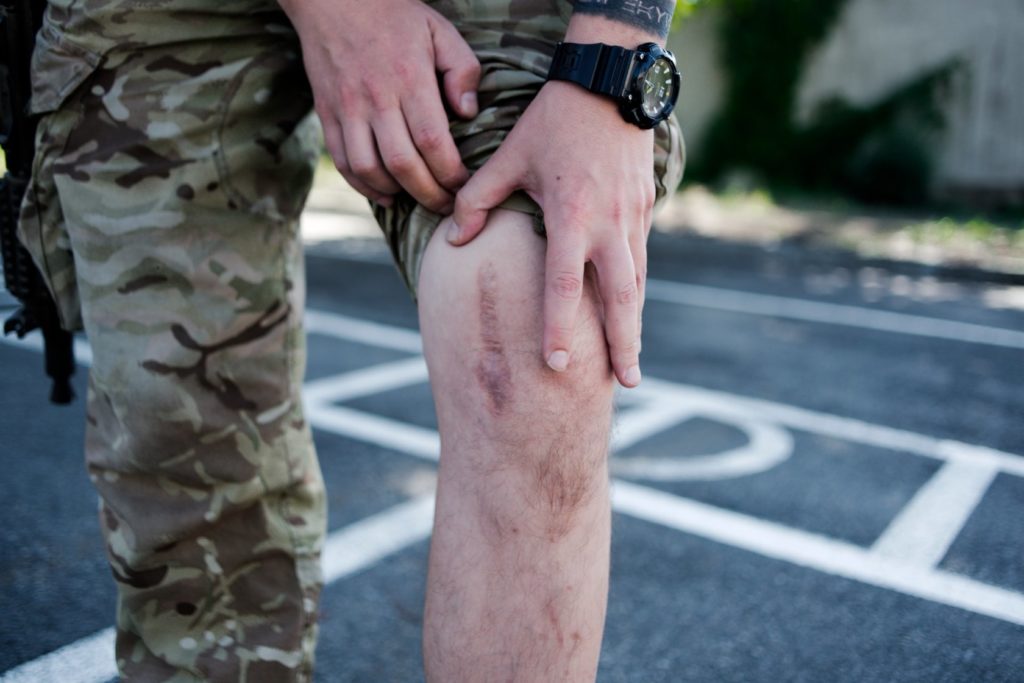
I was wounded in an IFV. There was a very strong explosion in the turret. This whole thing flew through Yura, Max got a large-caliber bullet in his knee. And he was like, “They hit me. In the leg” and straightened his leg. “Oh, it’s cool, forget it!” Then the same happened to the other leg. I do not remember what was after that. Together with a tank commander and a gunner we crawled in body armor to the wooded area. They left to seek help. One of them had his heel torn off; I and “Volynyaka” stayed where we were. His teeth ached, he took two pills of Ibuprom; now he says thanks to it he had survived. Then he left too. And then – a blackout. I remember nоthing. I came round, to my view, because an SU (SU-27 airplane) was shot down.
We have seen enough of Soviet films, that proclaim you cannot be taken, prisoner. I was calling Dubovsky. I mean, I thought I was calling him, but it turned out to be «Grisha Pravosek», my neighbor. I said, “Max, I will blow myself up!” – “Stop talking nonsense!” Then I called Dubovsky. He said, “Don’t you dare. The location has been defined, we will take you away.” Then Sergy said, “Don’t be foolish, we’ll make it in time!” Probably, because of these people I survived. It was all in a wooded area between Gorbatenko and Shevchenko (names of settlements). We drove by Shevchenko, and immediately at the turn, our “bekha”* was hit. But still, we drove in a column far enough.
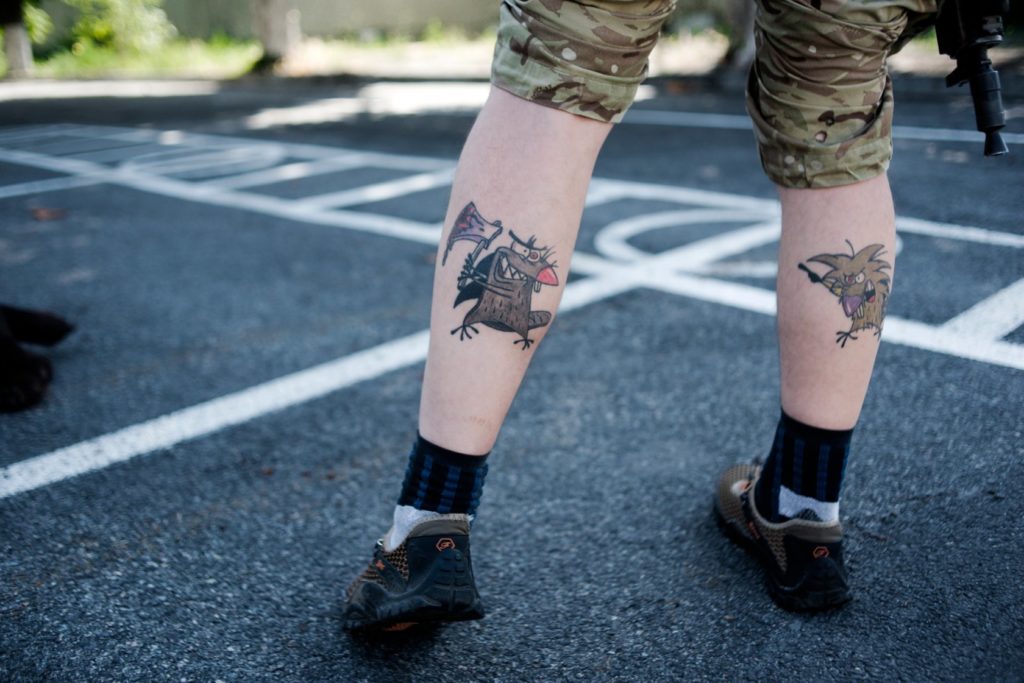
When we were brought to the separatists, the generator was buzzing, our eyes were tired, and because of a great loss of blood, we shook with cold. They put us on a stretcher and covered with some sort of blanket. And you understand that this is a wool blanket and you feel warm. And such a voice “Remove blankets from these … (I do not know how they called us).” They tried to bind us with bandages; also gave some slaps upside the head. My head was buzzing; really shitty. Such a voice, “Remove the blankets from them!” And another one, “Don’t do it, we carry our KIA on our backs.” But you don’t give a shit, just want it to be warm. I was lying under this blanket and did not know how all this would end.
There was a wounded colonel and one of the paramedics of the “Myrotvorets”, a true alarmist, “What will happen to us? What will happen to us? ” I sat beside the colonel, “Colonel, tell me, what will happen to him?” – “He will be the first to be shot, for saying a lot.” The warriors there were good ones. I would like to find that Uncle Vanya, or whatever his name … He was an armorer of the 51-st company. Late on we were brought to Novokaterynivka and someone asked us, “Who among you understands weapons?”
Our guys were like, “Well, we do.”, speaking such a pure Ukrainian language. The assistant was needed. I asked:Uncle Vanya, what did you do?
The gun had jammed, so, I fixed and lubricated it.
What have you done? They will be shelling at us with these guns!
No. No one lubricates a gun with solid oil. They have one shot maximum.
Four days we drank water from a pond, muddy slopes.
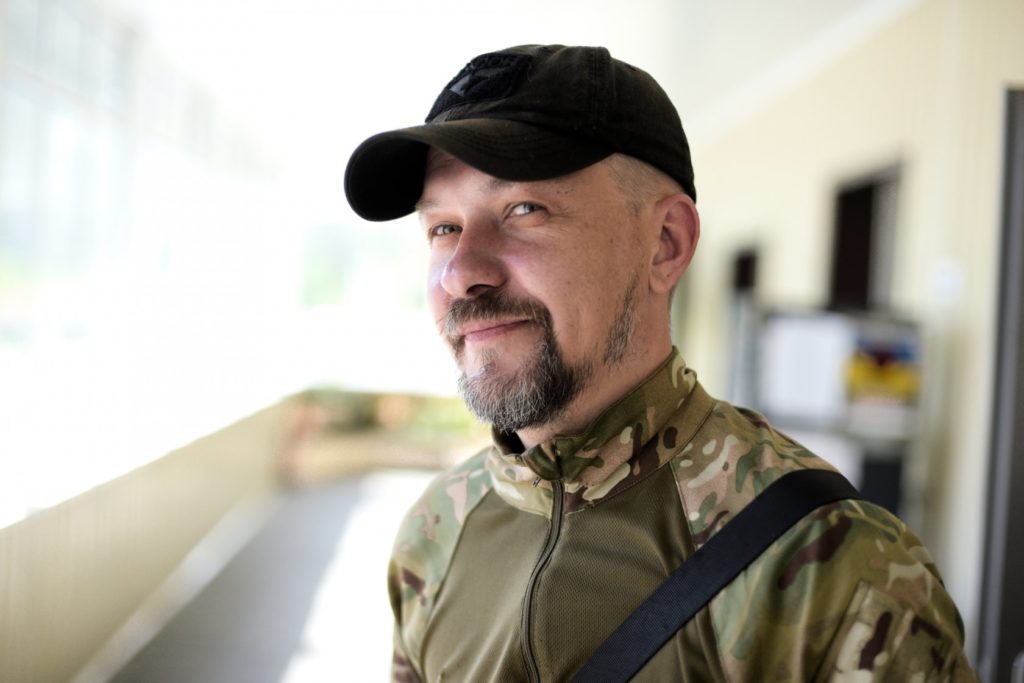
I communicated with the Russians a little. Once one came to us, started talking crap, “You will be judged in Rostov. They’ll put you in jail, they will let you go home.” And we replied, “Hey, boys, look at the map, and say where you are, whose territory it is.” There were aggressive ones, the Chechens.
When the Russians entered the hospital, they made me a partial amputation, sewed my knee. My eyes closed, the lidocaine injected, and you see the pipe dream; then the voice over my ear, “You will be given to the Red Cross today. And, please, tell your people that it’s inhumane to leave so many corpses in the field. Take them away.”
I can not say what kinds of people were among the militants. Everyone should understand what he is doing and for which purpose, everyone is responsible for their actions. Before the war I used to talk with Russians; they do not have the concept of “man.” They have the one concept – “the Russians”, and all the others (chinks, negros, Ukie, bulbash**). Nazism in its pure form. And I can say I love people.

